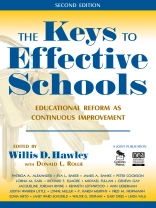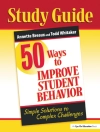Raise organizational effectiveness to improve the quality of instruction and dramatically impact student achievement!
Working in tandem with the powerful National Education Association′s KEYS initiative (Keys to Excellence in Your Schools), this second edition focuses on how to change a school′s organizational structure and culture to improve the quality of teaching and learning.
Each chapter, revised and updated to address continuous improvement and narrowing the achievement gap, provides a wealth of knowledge from leading experts in the field including
Patricia A. Alexander, Eva L. Baker, James A. Banks, Peter Cookson, Lorna M. Earl, Richard F. Elmore, Michael Fullan, Geneva Gay, Willis D. Hawley, Jacqueline Jordan Irvine, Kenneth Leithwood, Ann Lieberman, Judith Warren Little, Lynne Miller, P. Karen Murphy, Fred M. Newmann, Sonia Nieto, Janet Ward Schofield, Walter G. Stephan, Gary Sykes, and Linda Valli.
Educators at all levels, policymakers, and parents will discover how to apply the lessons learned from research. This essential handbook provides new chapters, including exemplary practice on teaching and learning for a multicultural society and on continuous school improvement.
Now you can advance to the next level of change with an integral resource for school reform.
Spis treści
Introduction to the Second Edition – Reg Weaver
Preface: The Problem of Continuous School Improvement – Donald L. Rollie
1. Educational Reform as Continuous Improvement – Michael Fullan
2. Contextualizing Learner-Centered Principles for Teachers and Teaching – P. Karen Murphy and Patricia A. Alexander
3. Improving Acheivement for All Students: The Meaning of Staff Shared Understanding and Commitment – Fred M. Newmann
4. Professional Communication and Collaboration – Judith Warren Little
5. Teacher Use of Formal Assessment in the Classroom – Eva L. Baker
6. Assessment as Learning – Lorna M. Earl
7. Transforming Professional Development: Understanding and Organizing Learning Communities – Ann Lieberman and Lynne Miller
8. Design Principles for Learner-Centered Professional Development – Willis D. Hawley and Linda Valli
9. Organizational Conditions That Enhance Teaching and Learning – Kenneth Leithwood
10. Continuous School Improvement – Willis D. Hawley and Gary Sykes
11. Essential Principles for Teaching and Learning for a Multicultural Society – James A. Banks, Peter Cookson, Geneva Gay, Willis D. Hawley, Jacqueline Jordan Irvine, Sonia Nieto, Janet Ward Schofield, and Walter G. Stephan
12. Local School Districts and Instructional Improvement – Richard F. Elmore
About the Editors
About the Contributors
Index
O autorze
Willis D. Hawley is Professor of Education and Public Affairs at the University of Maryland, where he served as Dean of the College of Education from 1993 to 1998. He taught at Yale, Duke, and Vanderbilt universities before going to Maryland. He has published numerous books, articles, and book chapters dealing with teacher education, school reform, urban politics, political learning, organizational change, school desegregation, and educational policy. His most recent research deals with the professional development of teachers, the education of teachers (in the United States and Japan), school restructuring and effectiveness, family influences on the academic performance of Southeast Asian children in the United States, and race relations. He has served as consultant to numerous public agencies, including the Executive Office of the President, the U.S. Senate, the U.S. Department of Education, and the World Bank, as well as many state and local governments, foundations, and professional associations. He also organized and directs the Common Destiny Alliance, a coalition of national organizations and scholars interested in using research to improve intergroup relations.












